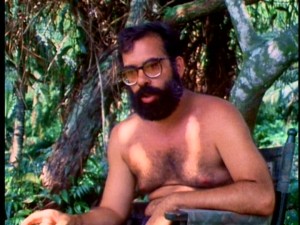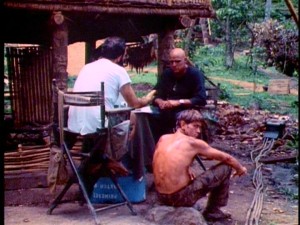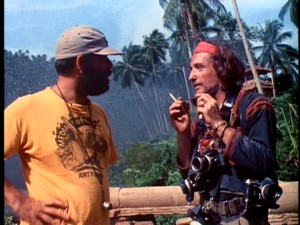The 1991 documentary Hearts of Darkness: A Filmmaker's Apocalypse opens with the revelation that Orson Welles selected Joseph Conrad's turn-of-the-20th-century novella Heart of Darkness as the project which would mark his film debut. Of course, it wasn't to be; studio executives feared it would be too costly and controversial. Welles would instead go on to make Citizen Kane, which more than sixty years later is considered the absolute greatest film ever made. Excerpts from Welles' late-1930s radio broadcast of a Heart of Darkness dramatization feature throughout the film.
In the mid-1970s, director Francis Ford Coppola had high hopes for filming an adaptation of Conrad's text. He not only wished to make something that would, like Kane, be celebrated and discussed for years to come; he wanted to make something that captured the essence of the Vietnam War from an American soldier's point of view. The script by John Milius, which transposed Conrad's book to southern Asia, was a starting point, but Coppola had many ideas and revisions of his own, not to mention grand visions.
There were some missing pieces: coherency was one, major studio support was another. These were things that Coppola, fresh off his award-showered The Godfather and sequel plus highly-acclaimed The Conversation, figured could be worked out along the way, as he shipped off to the Phillippines with a mix of Italian and American crew members to film Apocalypse Now.
Joining the director was his wife Eleanor and their three young children (including future Lost in Translation director Sofia, then just 4). They were there to keep the close-knit Italian-American family together, but Eleanor was soon given a job as the camerawoman assigned to document production for the typical studio-distributed 5-minute piece down the line. This vast stroke of luck would eventually enable the world a front row seat for one of the most arduous and interesting shoots in cinema history. Being the director-writer-producer's spouse made few things off-limits for Eleanor. She would accumulate many hours of footage during a production period that though scheduled for four months would persist for well over a year and be marked by a variety of tumult.


The stakes on Apocalypse Now were both high and personal for the Coppolas; without much financial backing from studios (United Artists cautiously lent limited support with stipulations), they were forced to pour their own money into the production, mortgaging their homes and possessions in the process. Production began with Mean Streets' Harvey Keitel in the lead role of Captain Willard. After looking over the first two weeks of shooting, Coppola decided he needing a new leading man; 35-year-old Martin Sheen was brought in.
The recasting and subsequent reshoots posed the first of many obstacles to be overcome on Apocalypse Now. A hurricane destroys a number of the production's sets. The helicopters being loaned by the Philippine army are repeatedly sent away on fear of enemy rebel attack. Martin Sheen suffers a near-fatal heart attack and is administered Last Rites. Cast in the critical role of the wayward Colonel Kurtz, Marlon Brando shows up overweight and utterly unprepared, while costing the film $1 million a week and being inflexible. All the while, Francis is skeptical of the film's chances at success and uncertain how to appropriately conclude the piece. Back in the United States, the media reports with some relish that Apocalypse Now is over budget and well behind schedule.
Rather than sensationalizing the facts, Eleanor's calm narration makes some sense out of the remarkable proceedings, while her images and surreptitious tape recordings keep fascinating tabs on her passionate filmmaker husband as he loses weight and wrestles fervently with self-doubt. The late-'70s footage is complemented by retrospective interviews with principal cast and crew members filmed about thirteen years after those uncertainty-filled times in the Philippines. Among those speaking is Star Wars creator George Lucas, who was originally tapped to direct the film in a documentary-style fashion in the real Vietnam.


There's little question that Francis Ford Coppola comes across as being somewhat insane in this film. But it's the most admirable kind of insanity with which he's afflicted in his quest to create transcendent art. Drained physically and financially but yearning to do justice to a fresh key chapter in American history, a culturally significant piece of literature, and moviegoers' sensibilities, Coppola is filled with considerably-documented despair.
We all know how it turned out; Apocalypse Now overcame mixed reviews from critics and viewers to do solid box office business and garner a plethora of awards and nominations. The director's bombastic claim at Cannes, "My movie is not about Vietnam... my movie is Vietnam", which appears at the start of Hearts, actually makes sense in context and retrospect. The ending gets even happier when we look beyond the immediate reception; time has let the film's instantly-recognized strengths and initially perceived weaknesses both look a little better. It is the rare arbiter of cinema who fails to herald Apocalypse Now as one of the strongest classics of contemporary film and a meaningful artistic and dramatic triumph. Perhaps even more satisfying than the kudos piled upon Coppola's maddeningly-produced war epic is the fact that he and Eleanor, countless trying experiences and one unflattering documentary later, remain married; in February, they'll celebrate their 45th anniversary.
Hearts of Darkness: A Filmmaker's Apocalypse surfaced in 1991 after young novices Fax Bahr and George Hickenlooper worked to mine a feature from Mrs. Coppola's footage and diary entries. Embarrassed by his depiction but sympathetic towards an aversion to studio interference, Francis had his American Zoetrope studio back the documentary, which debuted on pay cable channel Showtime, was exhibited at the Cannes Film Festival, and eventually received a limited US theatrical release in the fall of 1991. Among the honors earned by the film were two Emmy Awards. Though unanimously praised, Hearts seemed like it might never show up on DVD. Then about a month ago, its format debut was scheduled with unusually limited forewarning. At last, it reaches stores on Tuesday.
 |
DVD Details
1.33:1 Fullscreen (Original Aspect Ratio)
Dolby Surround 2.0 (English)
Subtitles: English, French, Spanish
Closed Captioned
Extras Subtitled
Release Date: November 20, 2007
Suggested Retail Price: $24.99
Single-sided, dual-layered disc (DVD-9)
Black Keepcase with Side Snaps and Cardboard Slipcover |
VIDEO and AUDIO
Hearts of Darkness is presented in 1.33:1 fullscreen, its apparent original aspect ratio. Naturally, picture quality varies quite a bit. The location production footage reveals plenty of technical limitations and age. The early '90s interview sessions are less troubled, but they too lack the sharpness and cleanliness of present-day documentaries. The fair amount of Apocalypse Now clips expectedly appear in letterboxed widescreen and look okay (not good enough to be mistaken for the film's own DVD). Coppola's studio American Zoetrope usually takes pains to make their films look their best and certainly there was plenty of time for that to happen here.
In spite of this, I think there's some room for improvement, even acknowledging the modest origins and substantial age of much of the footage. The bonus documentary is presented in 1.78:1 anamorphic widescreen and looks terrific.
Like most non-concert documentaries, Hearts isn't designed to give your home theater a vast aural workout. But I was both surprised and impressed by how clear all of the dialogue was in this Dolby Surround mix, knowing that Mrs. Coppola's sound equipment wasn't top-of-the-line feature-worthy and that most of her recordings are done outside. Music is used lightly but effectively and "The End" by The Doors is about as potent here as it is in its similar reprisal in Apocalypse Now. The shared surround channel mainly offers very slight reinforcement and some echoing. Bonus doc CODA is also served up in Dolby Surround and it takes advantage of 16-30 years of sound advances to deliver a crisper and more robust experience.


BONUS FEATURES, MENUS and PACKAGING
There are only two bonus features provided, but both are quite substantial.
First comes an audio commentary on the feature by Eleanor and Francis Ford Coppola. Recorded separately, the couple provides very different but highly enlightening perspectives on the film. Saying more, Eleanor recalls her persistence in the face of utter inexperience and remarks upon her processes as a novice documentarian. Francis is embarrassed, defensive, and apologetic, while shedding light on his point of view of the chaos. It's a good listen and an excellent addition.
The DVD also includes CODA: Thirty Years Later, a 66-minute documentary directed and introduced by Eleanor Coppola. It covers the making of Youth Without Youth, a soon-to-open film which marks Francis Ford Coppola's return to directing after ten years away. With sufficient funds, complete authority, and a clearer vision, the independent drama's production in Bucharest is considerably less ambitious and eventful than the one documented in Hearts. After seeing this, I'm still having difficulty summoning interest in Youth, which tells of a man's atypical life span, stars Tim Roth, and is adapted from a novella by Romanian philosopher Mircea Eliade. But Mrs. Coppola still manages to aptly convey the significance of a project that's considered personal by her husband. She also captures Francis' thoughts on big ideas (at one point, expressed in a discussion with himself) involving the film's central theme of consciousness and his preference for a specific filmmaking process.
The disc would have really benefited from the inclusion of some trailers. One for Hearts of Darkness should have been a no-brainer, while the trailers for the original theatrical release and 2001 redux of Apocalypse Now not only would have added value but they'd have made up for their absences from the two-disc The Complete Dossier (which rendered its moniker untrue). For that matter, a gallery of Coppola trailers would have been fantastic, considering how many of his films have been distributed by Paramount.
The low-key main menu cycles through a collection of stills from Apocalypse Now's production against a background of orange-tinged helicopter footage, while an eerie piece of music is looped. Though the standard keepcase is housed in a cardboard slipcover, it does little besides add a spine and a sticker touting the bonus documentary. There are no inserts.


CLOSING THOUGHTS
Long considered one of the most noteworthy films absent on DVD, Hearts of Darkness finally arrives on the format without enough fanfare. This awesome documentary delivers practically everything you could hope for, both in detailing the storied production of Apocalypse Now and illustrating just how far one unique filmmaker would go in the hopes of making something relevant, important and lasting. Serving as the only supplement, the fine hour-plus documentary on Coppola's return to directing is relevant enough to stand as something of an adequate sequel to the feature.
While the presentation isn't quite a dream come true, and the disc will set you back quite a bit for something seemingly fit for Apocalypse's latest DVD release, Hearts of Darkness still earns a very high recommendation. Whether you're a fan of Apocalypse Now, Coppola, or just the art of filmmaking, you will find plenty to marvel at here. With the added value of the commentary and bonus documentary, the disc easily merits a place in most serious DVD collections.
More on the DVD / Buy from Amazon.com


